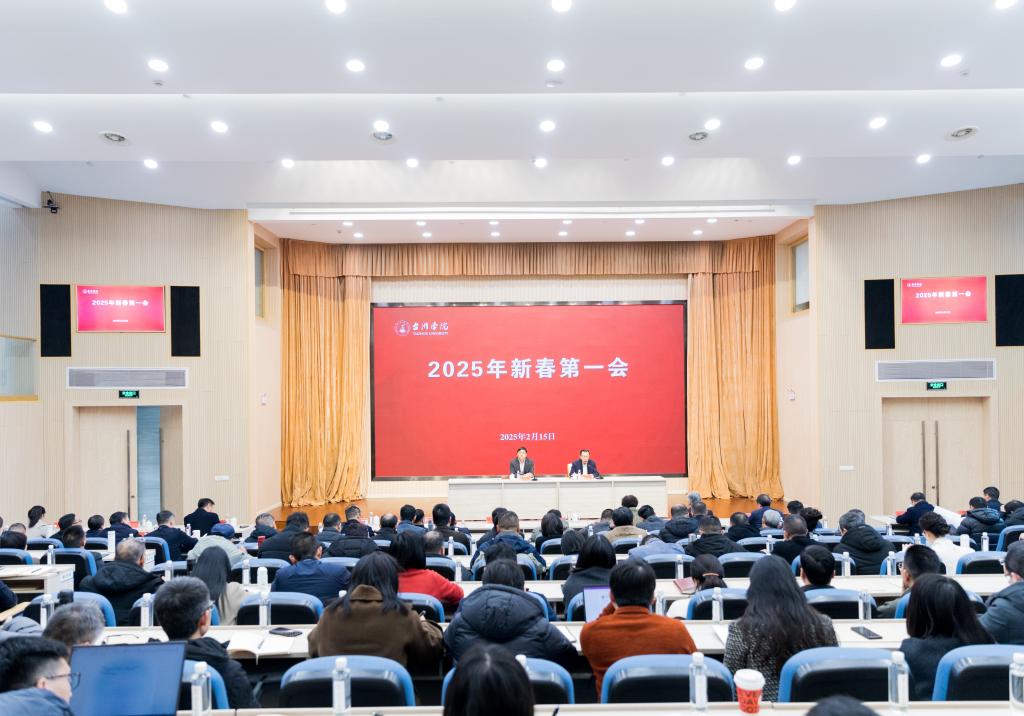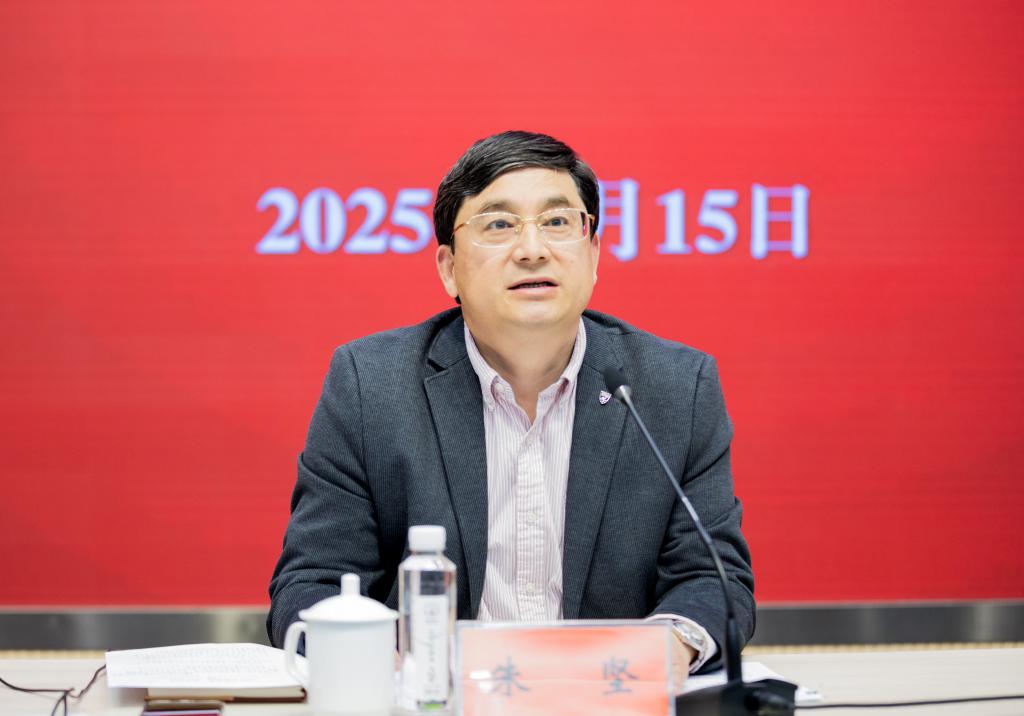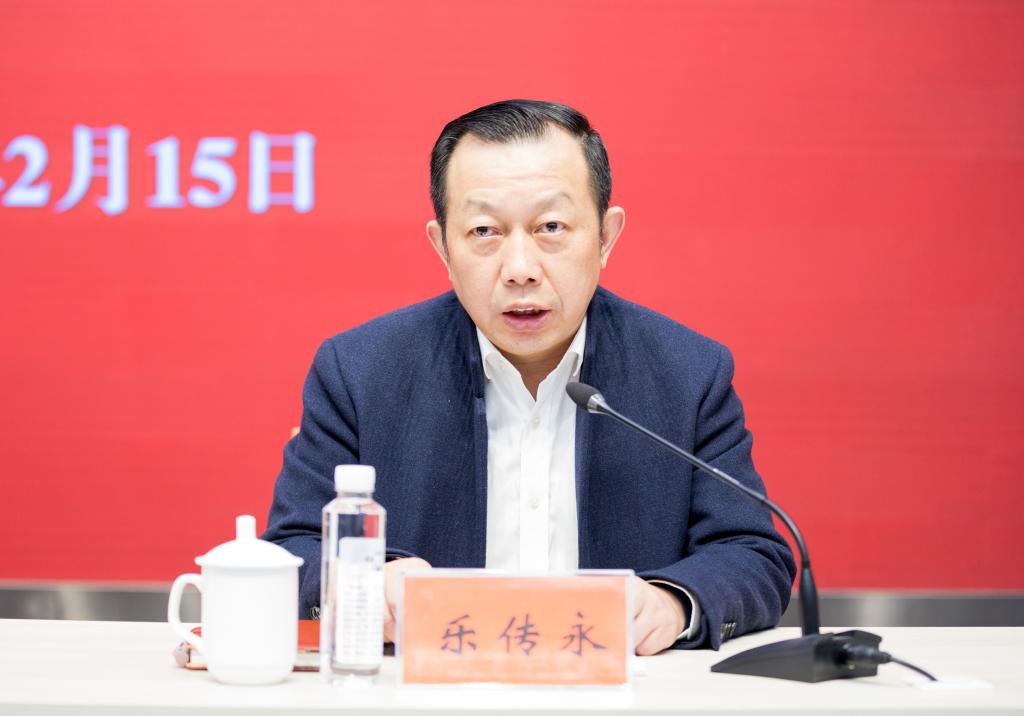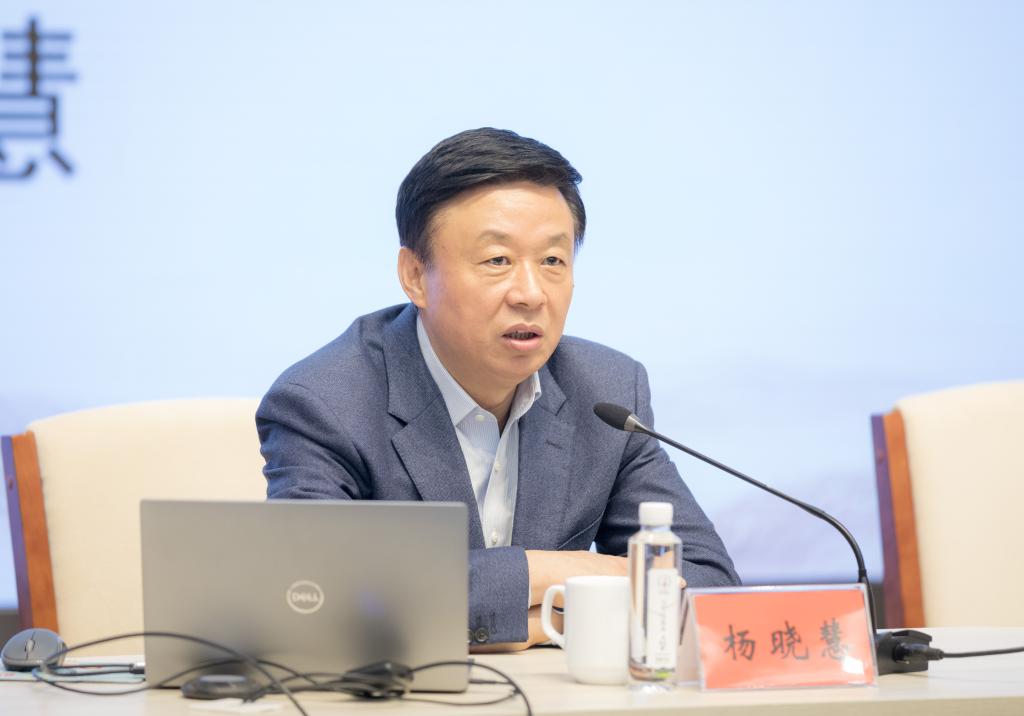Taizhou University held its first meeting of the year 2025 on February 15th, setting the keynote, highlighting key points, and pointing out the direction for the year’s development. Zhu Jian, Secretary of the CPC TU Committee, presided over the meeting and delivered a speech, emphasizing the need to unify thinking, build consensus, coordinate efforts to promote the upgrading of the university and the application for doctoral degree programs, strive to be first-class, and unite to accelerate the construction of a high-level applied university with distinctive features. Yue Chuanyong, President and Deputy Secretary of the CPC TU Committee, deployed the work for the new semester, and members of the university’s leadership team attended the meeting.

The First Meeting of the New Year
Zhu Jian pointed out that in the past year, TU led high-quality development with high-level Party building, creating “an atmosphere of unity and cooperation, an atmosphere of tackling difficulties, an atmosphere of pragmatism and willingness to work, and an atmosphere of honesty and integrity” throughout the university. The political ecology continued to improve, forming an atmosphere of unity, harmony, and vigor for officials to engage in entrepreneurship, and all undertakings achieved rapid development.
The university was invited to speak at the 2025 Provincial Education System Work Conference and the Comprehensive Strict Governance over the Party Conference, receiving a positive response. It received the titles of a first-class unit and an advanced unit in the municipal comprehensive assessment, and was awarded the honorary titles of the advanced collective and individual in focusing on the “Three Paths” and striving for the “Three Highs and Three News,” as well as the advanced collective for “Standing at the Forefront and Striving for Excellence through Practical Work.”

Zhu Jian presides and delivers a speech
Regarding promoting the upgrading work, solving key core indicators, and achieving high-quality development, Zhu Jian emphasized that, firstly, it is necessary to grasp the chief task and coordinate efforts to promote the upgrading of the university and the application for doctoral degree programs. Both upgrading to a higher-level university and applying for doctoral degree programs are inspections of a university’s educational structure, scale, and level. In particular, applying for doctoral degree programs focuses on inspecting the level of discipline construction, which is more helpful for TU to firmly establish the leading position of discipline construction and drive the high-quality development of all aspects of the university through discipline construction. Applying for doctoral degree programs is a powerful driving force for discipline construction, an inherent requirement for promoting the construction of high-level universities, the only way to enhance universities’ ability to serve regional economic and social development, and an important measure to improve the level of undergraduate education.
Secondly, it is necessary to prosper a city and accelerate the cultivation of school-running characteristics. School-running characteristics are the most prominent symbol of a university and also the core competitiveness for a university to develop and grow. TU should further refine its school-running characteristics and build a high-level applied university with prominent advantages in engineering, a profound foundation in teacher education, and coordinated development of multiple disciplines.
Regarding prominent advantages in engineering, it is necessary to draw a good “dot-line-area” map, promote in-depth and practical services for local areas; build a “direct bus” to deepen the integration of government-industry-academia-research innovation; and deliver a “combination punch” to maximize the vitality of talents.
Regarding the profound foundation in teacher education, it is necessary to advance the “classroom revolution” with solid and practical measures, test the “classroom revolution” with the effectiveness of talent cultivation, and focus on the “classroom revolution” to adapt to technological changes.
Regarding the coordinated development of multiple disciplines, on the one hand, it is necessary to promote the characteristic development of multiple disciplines; on the other hand, it is necessary to promote the cross-integration of multiple disciplines, especially facing the six future industries in Taizhou, and cultivate new growth points for school-running.
Thirdly, it is necessary to enhance the overall situation awareness and seek truth and be pragmatic in implementation. Whether it is coordinating efforts to promote the upgrading of the university and the application for doctoral degree programs, striving to be first-class with united efforts, or building a high-level applied university with prominent advantages in engineering, a profound foundation in teacher education, and coordinated development of multiple disciplines, it requires implementation with the spirit of reform and tackling key problems.
It is necessary to comprehensively deepen and implement the project of fostering virtue through education in the new era, adhere to fostering talent by strengthening their ideals and beliefs with Xi Jinping Thought on Socialism with Chinese Characteristics for a New Era, and cultivate high-quality applied talents with “patriotic feelings, pioneering spirits, and solid skills.”
It is necessary to take the construction of provincial-level Party building demonstration universities as the starting point, thoroughly implement the political responsibility of comprehensively and strictly governing the Party, consolidate and deepen the results of Party discipline learning and education, and hold fast to the position of educating people.
It is necessary to establish a long-term mechanism for strengthening the construction of teachers’ ethics and style across the entire chain, promote the integration of the spirit of educators into the entire process of teacher training and management, and implement a “zero-tolerance” policy for violations of teachers’ ethics by focusing on key points in implementation.
It is necessary to focus on the implementation of upgrading to a higher-level university, applying for doctoral programs, and striving to be first-class, the integrated development of education, science, and technology talents, and capacity building. Based on the university’s overall situation, improve planning and design capabilities, effectively turn directions into methods, goals into measures, and policies into resources, and ensure that actions are taken and tasks are accomplished immediately and effectively. Focus on serving teachers and students in implementation. Demonstrate care in fostering virtue through education, demonstrate effectiveness in talent cultivation, demonstrate warmth in service management, and strive to build the most caring university for students.
Zhu Jian emphasized that the university is facing a great opportunity for a significant improvement in the strategic position of education. It must maintain a forward-looking attitude of struggle, concentrate the driving force for advancement, vigorously carry forward the “six-do spirit” and the “four-thousands spirit,” seek truth and be pragmatic, coordinate efforts to promote the upgrading of the university and the application for doctoral degree authorization, strive for excellence with united efforts, and continue to accelerate the construction of a high-level applied university with prominent advantages in engineering, a profound foundation in teacher education, and coordinated development of multiple disciplines!

Yue Chuanyong assigns work for the new semester
Yue Chuanyong comprehensively reviewed the university work of the past year from eight aspects, including strengthening of discipline construction, quality improvement and upgrading of talent cultivation, results in team building, promotion of achievement cultivation, service to local areas, development of international cooperation, improvement of school-running conditions, and service guarantees.
Yue pointed out that in the past year, under the strong leadership of the university’s Party committee, all lines, departments, and academic schools have closely focused on “upgrading to a higher-level university, applying for doctoral programs, and striving to be first-class,” closely followed the key work of the university’s Party and government, carried forward the spirit of continuous operations and tackling difficulties, implemented tasks one by one, pursued effectiveness item by item, and the work was noteworthy and quite effective.
Yue emphasized that 2025 is a crucial year for implementing the spirit of the National Education Conference and implementing the Outline of the Plan for Building China into a Powerful Country in Education, the closing year of the 14th Five-Year Plan and the planning year for the 15th Five-Year Plan, and also the year for the country to accelerate the overall layout and high-level promotion of building China into a powerful country in education. It is also a crucial year for the university to promote its upgrading work.
It is necessary to aim at the construction of degree programs, the cultivation of teaching achievement awards, the application for scientific research awards, the construction of a new campus, and other goals, and effectively enhance the sense of responsibility, urgency, and initiative in implementation, complete the target tasks of the 14th Five-Year Plan with high quality, and lay a solid foundation for a good start to the 15th Five-Year Plan. Yue Chuanyong made specific deployments for sprinting to work in the new year in seven aspects.
It is necessary to refine the distinctive advantages of disciplines, cultivate more high-quality achievements, scientifically deploy the construction of degree programs, continuously strengthen the leadership of first-class disciplines, and vigorously promote the cultivation of landmark achievements.
It is necessary to deepen the reform of industry-education integration, effectively improve the effectiveness of education, comprehensively deepen the classroom revolution, deeply cultivate teaching achievements, and enliven the article of talent cultivation.
It is necessary to adhere to the strategy of strengthening the university with talents, strengthen the introduction, cultivation, employment, and retention of talents, strengthen precise and targeted talent recruitment, promote mutual employment and sharing between the university and enterprises, and improve the talent work mechanism.
It is necessary to build and make good use of service platforms to help the rapid development of the region. Comprehensively deepen university-locality cooperation, accelerate the construction of high-energy platforms, and amplify the effectiveness of serving local areas.
It is necessary to actively integrate into the overall situation of openness, strengthen international exchanges and cooperation, achieve new results, strive for new breakthroughs, and explore new paths. It is necessary to focus on serving the center and the overall situation, and strive to improve the service.

Professor Yang Xiaohui delivers a special tutoring report
Professor Yang Xiaohui, former Party Secretary of Northeast Normal University, was invited to give a special tutoring report titled “In-depth Study of President Xi Jinping’s Important Discourse on Education to Accelerate the Construction of an Education Powerhouse.” In his report, Professor Yang initially elaborated on the significant importance of building an education powerhouse for the construction of a strong country, and introduced the writing process of the textbook “Lectures on President Xi Jinping’s Important Discourse on Education,” for which he served as the chief editor. Afterwards, he interpreted the content system of President Xi Jinping’s important discourse on education from three aspects: strategic vision, content system, and significant meaning. He emphasized the “Nine Persistences” in educational reform and development, as well as how to address the fundamental issue of “who to cultivate,” “what kind of people to cultivate,” and “how to cultivate people.”
Members of the leadership retaining their benefits, all middle-level cadres, and heads of directly affiliated units attended the meeting.